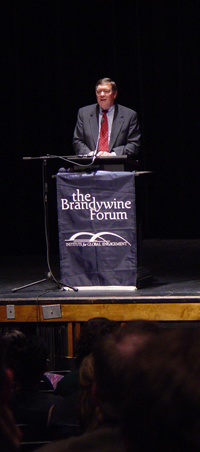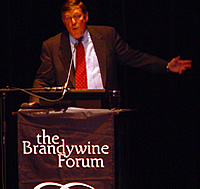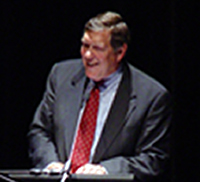


AMBASSADOR ROBERT A. SEIPLE
is Founder and President of the Institute for Global Engagement. Prior
to its foundation, Seiple spent two years at the State Department as
the first-ever U.S. Ambassador-at-Large for International Religious
Freedom. He has spent his professional career in leadership positions:
serving as president of World Vision (1987-1999); the president of Eastern
College and Eastern Baptist Theological Seminary (1983-1987); and as
the director for athletics and the vice president for development at
his alma mater. Brown University (1970-1983).
The Brandywine Forum took place in a sumptuous setting, made of nature's greens and stones, at the Eastern College, very area where flows the Brandywine creek, in South Eastern Pennsylvania.
The Most Rev. Bishop Jean Marie had been invited by the founder of the Institute for Global Engagement -Ambassador Robert Seiple- to participate in the 2002 Forum; the latter dealt with the subject of reconciliation, which includes truth, mercy, justice and peace.
The concern to develop durable environments for freedom of religion throughout the world has brought together at Eastern College numerous participants from very diverse religions, countries and walks of life.
A musical welcome was given in the auditorium, featuring various interpretations of inspirational and Christian songs by Mr. Amstrong Slater. Then, Ambassador Robert A. Seiple started to reflect on the subject: "Upgrading the Wardrobe".
His discourse started with September 11 tragedy, and the distress it left in hearts; as an example he cited also the sufferings of the Sudanese people, which remain unnoticed to the eyes of many.
Jesus' words bring a message of reconciliation and pardon through the Cross. We have to accept sacrifice. In the Lord's life, the adulterous woman, according to Mosaic Law, must be stoned to death, and the Lord does but write silently on the sand. Finally, Jesus spoke, and the eldest ones left the scene. There is no chance of reconciliation if one clings to stones in one's hands. Then Jesus requested the woman to change her heart, and this again was an appeal to reconciliation…
Ambassador Seiple then went on with the parable of the Prodigal Son, the importance of justice, peace, truth, mercy, compassion and forgiveness; the way the father celebrated his son's return to life.
Truth: striking examples were presented by Mr. Seiple, notably taken from his own, personal experience with his Vietnamese commander; how they broke the ice by confessing to one another what they had done during that war. They told the truth to one another about the past, ever present in their hearts.
Mercy: the best example is the Lord on the Cross: Father, forgive them. This is true reconciliation; and do not be mislead to think that the Lord alone can forgive. How many instances of forgiveness among people, like this Rwandan woman, undergoing torture and yet praying for her executioners.
Mercy is truth, mercy means being witnesses to reconciliation, where so ever we happen to be: this is not an easy task. Mercy is the memory Jesus' prayer on the Cross leaves on our minds.
Most Rev. Bishop Jean Marie made it a
point to thank Ambassador Seiple for these times of deep reflection, so
that peace and mercy may prevail in hearts, and that everyone may, wherever
they happen to be in this world, pursue in all freedom the ideal of their
religious convictions.